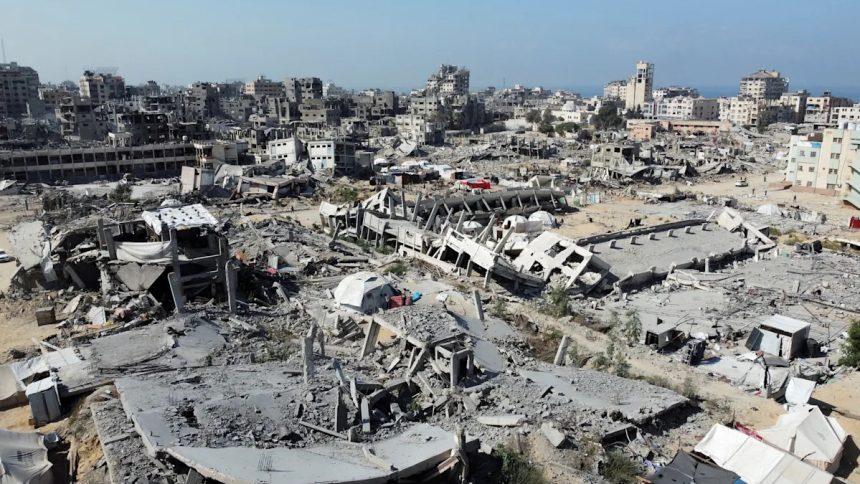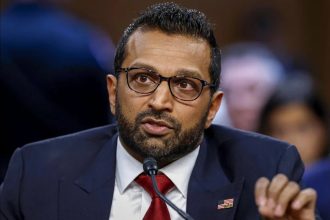Israel’s military has launched a wave of air strikes on southern Gaza as the fragile United States-brokered ceasefire intended to end the two-year war comes under threat.
The Israeli army said on Sunday that it was conducting a “massive and extensive wave” of strikes on dozens of targets, just hours after it struck the city of Rafah, claiming its troops had come under fire from Hamas fighters in the area.
An Israeli security official also told news agencies that the transfer of humanitarian aid into Gaza would be halted “until further notice” after the alleged Hamas ceasefire violation.
Gaza’s Civil Defence agency said a number of Israeli air raids had killed at least 15 Palestinians since the morning across the war-devastated enclave.
The Israeli army said it responded with strikes and artillery fire after its troops were targeted by Hamas. However, Hamas’s armed wing said it is adhering to the ceasefire agreement.
“We have no knowledge of any incidents or clashes taking place in the Rafah area, as these are red zones under the occupation’s control, and contact with the remaining groups of ours there has been cut off since the war resumed in March of this year,” the Qassam Brigades, the armed wing of Hamas, said in a statement on Sunday.
Reporting from Gaza City, Al Jazeera’s Hani Mahmoud said that Palestinians are “very concerned” about the sudden escalation.
“Fear and panic are dominating the scene among people in Gaza as Israel’s military launched more than 20 air strikes. We’ve been approached by people, including women and children, who are asking us if the war is back on,” Mahmoud said.
“Some said, ‘Now that Israel has got the captives back, they’re back at killing us.’ That’s the kind of sentiment we’re hearing.”
Israeli strikes in the south came as medical sources at Gaza’s Al-Aqsa Hospital told Al Jazeera that five Palestinians had been killed and an unspecified number wounded in an Israeli attack on az-Zawayda in central Gaza.
Three Palestinians were also killed and others wounded in an Israeli attack on the Nuseirat refugee camp, a medical source at al-Awda Hospital told Al Jazeera, while earlier, at least two Palestinians were killed in an Israeli air attack in northern Gaza, the Wafa news agency reported.
‘Mood changed’ in Israel
Israel’s strikes came after the country’s Prime Minister Benjamin Netanyahu held consultations with security heads and directed the military to take “strong action” against any ceasefire violations.
Reporting from Amman, Jordan, Al Jazeera’s Nour Odeh said that Israeli media reports suggested that Israel was acting in Rafah to protect armed proxies in Gaza it had supported throughout the war, amid fears they were facing reprisals from Hamas since the ceasefire.
“There were reports that perhaps Hamas fighters were trying to attack that militia in Rafah,” she said.
Odeh said that once reports of the clashes in Rafah surfaced in Israel, the mood there changed “almost immediately”.
Israel’s far-right National Security Minister Itamar Ben-Gvir said on X that he wanted the Israeli army to “fully resume combat in the Gaza Strip with maximum force”. Finance Minister Bezalel Smotrich posted: “War!”. And Amichai Chikli, the outspoken minister of diaspora affairs, said: “As long as Hamas exists, there will be war.”
Meanwhile, opposition leader and former member of Israel’s security council, Benny Gantz, said all options should remain on the table for Israel, “including a return to military manoeuvring”.
Speaking to Al Jazeera, analyst Yossi Mekelberg said the strikes underlined the fragility of the ceasefire agreement.
“We said all along that this ceasefire, it’s not the complete end of what we have witnessed over the last two years,” said Mekelberg, senior consulting fellow with Chatham House’s Middle East and North Africa Programme. “It’s a very fragile ceasefire, and can tilt in one way or another.”
Hamas rejects US claim
Earlier, the US State Department alleged it had “credible reports” indicating that Hamas would imminently violate the ceasefire deal with Israel – claims Hamas rejected.
“This planned attack against Palestinian civilians would constitute a direct and grave violation of the ceasefire agreement and undermine the significant progress achieved through mediation efforts,” the department said in a statement on Saturday.
In response, Hamas issued a statement saying the US allegations were false and “fully align with the misleading Israeli propaganda and provide cover for the continuation of the occupation’s crimes and organised aggression” against the Palestinians in Gaza.
Hamas accused Israel of supporting armed groups operating in Israeli-controlled areas.
The group also called on Washington to pressure Israel to stop supporting the gangs and “providing them a safe haven”.
Remains of returned captives identified
The strikes in southern Gaza came as Israel identified the remains of two captives released by Hamas overnight, and the Palestinian group said talks to launch the second phase of ceasefire negotiations have begun.
According to a ceasefire plan brokered by US President Donald Trump, the negotiations will include disarming Hamas and the establishment of an internationally backed authority to administer the Gaza Strip.
Netanyahu’s office said the bodies belonged to Ronen Engel, a father of three from Kibbutz Nir Oz, and Sonthaya Oakkharasri, a Thai agricultural worker killed at Kibbutz Be’eri.
The remains of 12 of the 28 captives’ bodies still in Gaza have so far been returned to Israel, which is pressuring Hamas to return more.
Hamas says it is committed to the terms of the ceasefire deal, including the handover of the remaining captive remains, but it needs help and heavy machinery to locate and retrieve bodies trapped under the rubble following Israeli strikes that have decimated Gaza.
It also said the Israeli military’s continuing control of certain parts of Gaza have slowed the recovery of the bodies.









